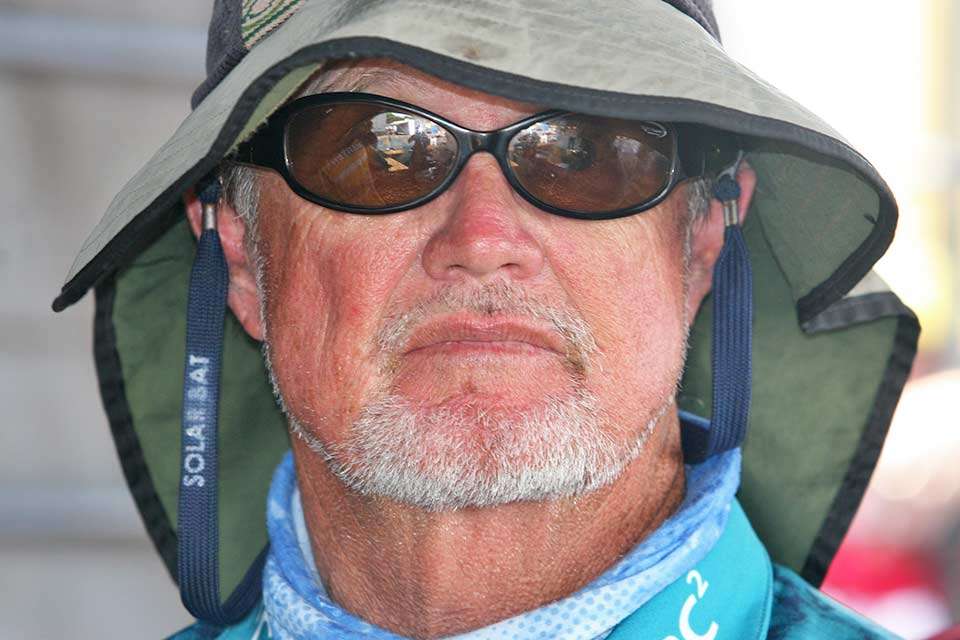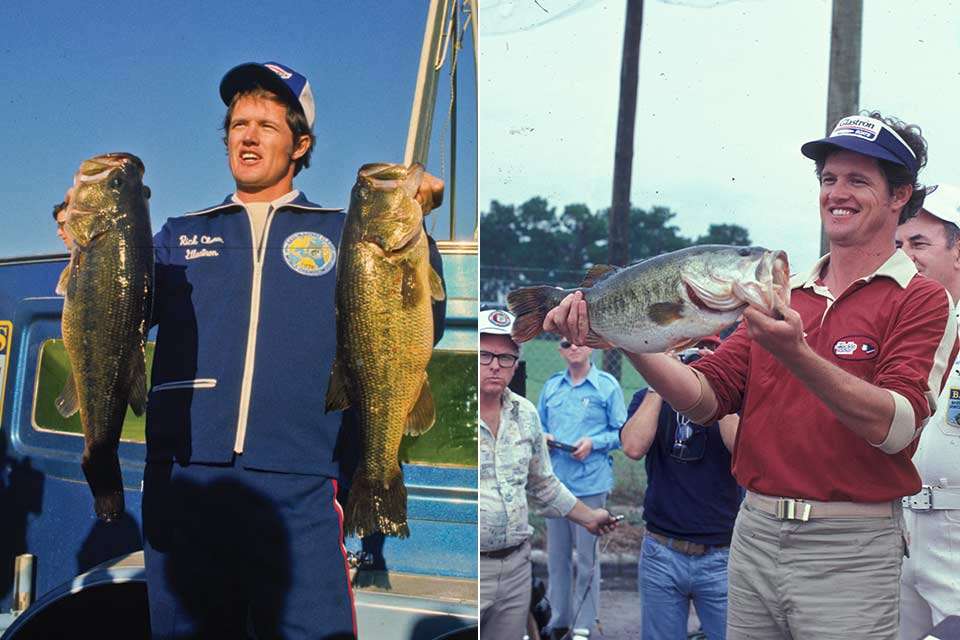
Rescheduling of B.A.S.S. tournaments due to the pandemic has the Bassmaster Elite Series anglers competing deep into fall, and Rick Clunn, for one, is looking forward to it.
“I’ve always liked fall events, and obviously we’re going to get an overdose of them,” he said. “Fall is my favorite time of the year to fish.”
It’s also when he’s found much of his success. Of Clunn’s 16 tour wins, almost a third have come in autumn, starting with his first in 1976 at the Lake Guntersville Classic.
“If you go back in time, you’ve got to realize the most important events in my whole career, in my early career especially, were the Bassmaster Classics,” Clunn said. “I knew for me to survive, I had to win that event, and they were all held in the fall.”
From the first Classic on Lake Mead in 1971 to Clunn’s back-to-back wins on Guntersville and Lake Toho, the bass fishing championships were at season’s end in late fall. Learning what works at that time of year sent Clunn from floundering to famous.
“I had two choices,” Clunn said. “One was either don’t figure this out and starve to death, or figure it out and win the Classic. Once I did that, I really kind of dominated the Classic until they moved it out of the fall.
“It was all a function of figuring out how to fish the Classic — that’s what it really was. I figured out how to fish the fall of the year on manmade lakes.”
The first 12 Classics were held after August, and Clunn had a rather amazing run. That first win on Guntersville was on Nov. 5, 1976, then he claimed his second the following year at Lake Toho on Oct. 28. He vied for titles the next two Classics, taking second on Ross Barnett and then third on Texoma. After a 15th on the St. Lawrence River, he was fourth in 1981 on the Alabama River.
Already solidified as a legend of the fall, Clunn would later win August Classics in 1984 on the Arkansas River and 1990 on the James River. Becoming bass fishing’s Zen Master hinged on him learning to unlock fall fishing.
When Bassmaster first began holding events, Clunn said most anglers prepared by spending as much time on the fisheries as possible, learning everything they could from locals and guides. Slowly, rules changed to make it a more even playing field.
“Early on, there wasn’t even off limits. You could go hire the best guides on the lake right up till the day the tournament started,” he said. “The only guys who didn’t do that were guys like me who didn’t know anybody to talk to. We were unknown, and we went to the lakes and were kind of on our own. You had to figure it out yourself.”
Necessity had Clunn studying seasonal patterns, learning where and how previous Classic winners fished. The first six Classics were on mystery lakes, where B.A.S.S. founder Ray Scott would announce the locale once their plane reached 30,000 feet.
“That’s the first time I ever saw fear in Bill Dance’s face, in Roland Martin’s face, in Jimmy Houston’s face, in Ricky Green’s face,” Clunn said. “At first it confused me because these were the guys I looked up to. Then it dawned on me, they didn’t know what to do, and I thought they did. That’s when I started really understanding how to prepare.”

Clunn was 16th in his first Classic on Lake Wheeler in 1974, then finished a respectable eighth in 1975 on Currituck Sound. In a do-or-die career situation where he needed to win or face ending his fishing career, Clunn used the tendencies of past Classic winners for his breakthrough.
Editor’s note: See Clunn’s Classic pawn.
“I just simply starting applying those patterns,” he said. “The name of the lake didn’t matter to me. I knew where I was going to fish before (Scott) even announced it. I didn’t know exactly, but I knew the part I was going to be looking at.”
Specifically, it was heading to the back of major creeks and throwing a spinnerbait. His other fall wins came on Nov. 2, 2004, in a Texas Open on Sam Rayburn and on Lake Livingston on Nov. 5, 1994. He’s had many other top-10 finishes in the fall, but he said it wasn’t because the time of year is necessarily more patternable.
“To a degree. In the early days, we simply broke it down to four seasons. Now we know that’s not completely accurate. Every season has multiple patterns within it,” Clunn said. “Spring was prespawn, spawn, postspawn and a mixture of everything else going on in the same time depending on what part of the lake you’re on.
“Every season has that complexity to it where you can’t just say, it’s the fall, it’s one pattern. There’s early fall, middle fall and right before it turns to winter. It constantly transitions. I think fall and the early summer are not as complex. I’m not a good quote, springtime fisherman. That’s kind of ironic because that’s what most anglers look forward to, but it’s never been that good to me.”
Clunn quipped that the only reason he ever got the better of Roland Martin is because the Great American Fisherman fell in love with turkey hunting. He said a lot of anglers enjoy hunting in the fall and might not have concentrated their efforts as much as he did.
“It’s not necessarily an easy time of the year, and I don’t want to give that impression, but it is a real definable time. You can really define pretty easily what’s going on in the lake,” he said. “It’s got an element of toughness to it that I like that the spring doesn’t always have.”
So Clunn admits he looks forward to the revised Elite schedule. More than four months since the St. Johns opener, the season resumes June 10-13 on Lake Eufaula. Newly added Cayuga Lake in mid-July starts a swing through New York that includes the St. Lawrence River and Lake Champlain. After Lake St. Clair in late August, there’s almost a six-week layoff before October tournaments on Santee Cooper and Chickamauga, and the finale will be in early November on Lake Fork.
Most Elite schedules have ended in September, but having true fall events has Clunn optimistic and enthusiastic. He said he’s always liked the curveball events, when time of year or weather conditions make waters not fish to script. So, it’s not a reach this revised schedule has him more hopeful of qualifying to his 33rd Classic.
“Sure, that’s in our genetics,” he said. “What I’ve been trying to do is completely change the way I fish, which is not conducive to making the Classic. The old way you had to make the Classic was catch a limit every day and get points every tournament. That’s what I used to be good at. Nobody could find fish faster than me. I don’t want to fish that way anymore. I want to say I caught 20 fish weighing over 100 pounds. I want to focus on and target the right fish. At the Elite level, 2-pounders aren’t any good any more.
“Now I’m trying to fish to win the tournament, but that also creates a lot of inconsistency. It’s balancing the two together in the right proportion is kind of where I’m at, and I don’t think I’m there yet.”

